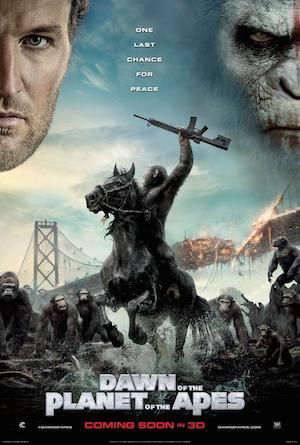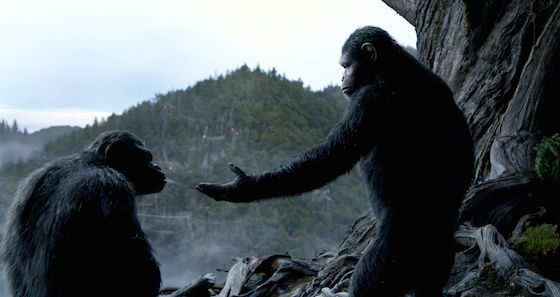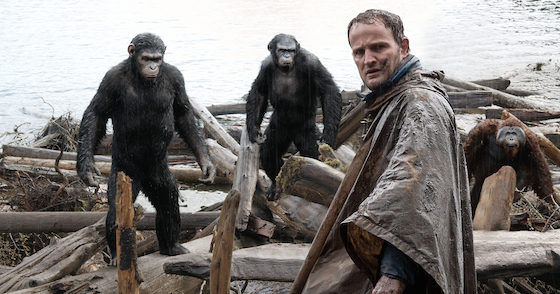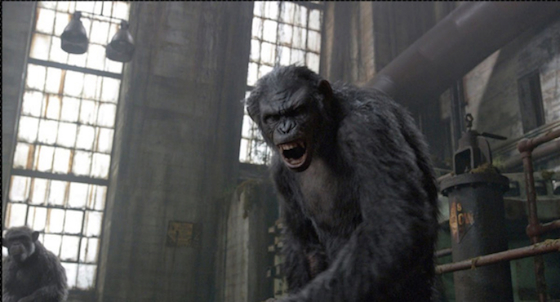 Caesar, the hyper-intelligent chimp that started a revolution in 2011’s Rise of the Planet of the Apes, which was surprisingly well received, given it was attempting to retrofit an origin story on a Sci-Fi classic. That film ended with the liberated apes of the San Francisco Bay area secluding themselves in the woods while a burgeoning pandemic began to sweep the globe.
Caesar, the hyper-intelligent chimp that started a revolution in 2011’s Rise of the Planet of the Apes, which was surprisingly well received, given it was attempting to retrofit an origin story on a Sci-Fi classic. That film ended with the liberated apes of the San Francisco Bay area secluding themselves in the woods while a burgeoning pandemic began to sweep the globe.
Dawn of the Planet of the Apes picks up 10 years later. Humankind has been decimated by illness, internal struggles and quickly depleting resources, but apekind has not only survived, but thrived. Director Matt Reeves wisely chose to focus this film on the tipping point between the two sides, rather than gloss over the events that lead to man’s eventual downfall, the result is big summer movie with an almost alarming amount of story and characterization, especially considering the majority of the cast is performing through performance capture.
The film opens on Caesar, again brought to life by the incredible Andy Serkis who almost deserves his own category in awards season at this point. Caesar is no longer the uncertain, somewhat frightened revolutionary depicted in the previous film. Now he is a leader, who has built a loyal tribe and even gone as far as formed his own family, which brings its own responsibilities he struggles with throughout the film.
One of the more fascinating details of Rise of the Planet of the Apes is the emergence of the ape culture we begin to see in the film. During the film’s opening and throughout, they communicate with each other through sign, which makes sense, as it’s how they initially learned language, but it also gives them a tactical advantage when hunting and tracking. There is a hierarchy and a chain of command. They live simple lives devoid of want beyond basic survival and companionship, and for the most part Caesar is an uncontested, benevolent leader, often flanked by Koba (played by Toby Kebbell), a research chimp who suffered some truly scarring tests during his times in captivity and Rocket (played by Terry Notary) another chimp freed during the first film.
Meanwhile, mankind is struggling. A small group of survivors from a CDC outpost in San Francisco ventures into ape territory in an attempt to investigate a hydro-electric dam. When they come face-to-face with Caesar and his colony, the initial conflict of the Dawn of the Planet of the Apes is set into motion and the plot doesn’t really slow down or trip over itself much after that.
 Jason Clark plays Malcolm, a human leader, who like, Caesar is faced with internal struggles, family responsibilities and a sense of duty to the people he feels obligated to protect. Clarke doesn’t have a lot to do, but he fills his role amiably, providing the kind of weariness and resolve expected in someone who’s survived mankind’s biggest calamity. He’s joined by Keri Russell as Ellie, his companion who has suffered her own losses and a grown up Kodi Smit-McPhee, who plays Malcolm’s disturbed son — a kid who had to grow up too fast and retreats into books and sketches whenever he can.
Jason Clark plays Malcolm, a human leader, who like, Caesar is faced with internal struggles, family responsibilities and a sense of duty to the people he feels obligated to protect. Clarke doesn’t have a lot to do, but he fills his role amiably, providing the kind of weariness and resolve expected in someone who’s survived mankind’s biggest calamity. He’s joined by Keri Russell as Ellie, his companion who has suffered her own losses and a grown up Kodi Smit-McPhee, who plays Malcolm’s disturbed son — a kid who had to grow up too fast and retreats into books and sketches whenever he can.
One of the biggest successes of Dawn of the Planet of the Apes is the even-handed way it treats its characters. Everyone, even the antagonists, are given tangible, understandable motivations for their actions. That sounds a lot simpler than it actually is. A lesser script would create a couple of big bads and throw the characters toward a nonsensical finale, but writers Rick Jaffa, Amanda Silver, and Mark Bomback deserve credit for crafting a script that manages to follow cause-and-effect logic extremely well and deliver a rich story in under two-and-a-half hours. Their treatment of the ape characters is exceptionally well handled both in their mannerisms and the economy of their language, which is simple and stirring. The plot does hang in the final third, but it’s quickly set on track by a big finish and a sharp resolution.
And even if there wasn’t a solid film underneath, Dawn of the Planet of the Apes is still a visual wonder. Weta Digital has outdone themselves and if it weren’t already clear that they’re capable of work that is equally or even more impressive than ILM’s, this film makes that statement for them. Dawn of the Planet of the Apes is more than a big summer movie. It’s a big summer movie that’s actually about something.




Comments on this entry are closed.